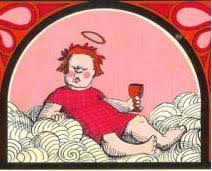It seems the natives have grown more and more restless during the 10 AM mass at Mount Calvary. Perhaps it might be helpful to add to the Litany these invocations from John Bellairs’ learned book.
St. Fidgeta, because she fidgeted uncontrollably during morning idolatry sessions, was martyred by being slapped to death by a pagan grammar school teacher. Her sign in art is the red slap mark on the cheek.
The Litany of St. Fidgeta
Quieter of the giggly, Teach us to sit still
Steadier of the wiggly, Teach us to sit still
Calmer of the tickly, Teach us to sit still
Rubber of the prickly, Teach us to sit still
From woolen shirts, squeaky corduroy and metal laundry tags, Sweet Fidgeta, deliver us!
From the unaccountable feeling that we can see our noses and that it will make us cross-eyed, Sweet Fidgeta, deliver us!
From feet that go to sleep and will almost certainly develop gangrene, Sweet Fidgeta, deliver us!
From the feeling that during the night we will contract leprosy and our toes will drop off and what will we do then, Sweet Fidgeta, deliver us!
From nuns who describe exactly what the Indians did to St .Isaac Jogues and his friends, Sweet Fidgeta, deliver us!
From demoniac possession, scabbly knees, and all causes of the desire to itch, twitch, or run screaming up and down, Sweet Fidgeta, deliver us!
St. Fidgeta is the patroness of nervous and unmanageable children. Her shrine is in the church of Santa Fidgeta in Tormento, near Fobbio in southern Italy. There one may see the miraculous statue of St. Fidgeta, attributed to the Catholic Casting Company of Chicago, Illinois. The statue has been seen to squirm noticeably on her feast day, and so on that day restless children from all over Europe have been dragged to the shrine by equally nervous, worn-out, and half-mad parents. Though no diminution has been noticed in the fidgeting of those children, the feeling is that the restlessness will at least be converted into meritorious work by the action of the saint. On this point see Tertullian, who proves that fidgeting is (or can be) useful unto salvation. Also, see Gregory of Mopsuestia, on fidgeting as a prelude to mystical experience.






